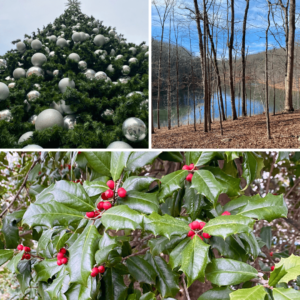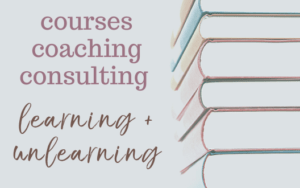Preface: This post took me more than six weeks to write. I started drafting on the winter solstice, so it feels right to publish on the cross-quarter day imbolc. I’ve needed the time to sit with the questions I share in this post—questions that are sure to keep evolving. I hope you’ll come with me on this journey into my spiritual life and desire to do the holidays differently.
The Holidays Are Hard. Do They Have to Be?
For me and for many of us, the holidays are hard. So much characterizes this time of year: expectations, longings, memories, disappointments, griefs, tensions, stresses, conflicts, responsibilities, and more. November and December come with expectations to do extra and participate in over-consumption, over-indulgence, and over-exhaustion. And this extra/over energy comes at the same time as the winter solstice (in the northern hemisphere)—a time for slowing down and going within. Shorter days invite sleep, rest, and reflection. The stark difference between the quieter energy of the solstice and the frenzied go-go-go of the holiday season is too much. It’s always too much.
Scrolling back through past blog posts, it’s clear how much I struggle with this time of year. And I’d really like to break the annual cycle. For myself, for my relations, for my spiritual life. As part of striving toward justice. As part of aging, reparenting, and healing.
Now that we’re through the intense holiday period, I’m reflecting on how to do this time of year differently.
I’m asking questions:
- What might help me move through the collective experience of “the holiday season” and keep me grounded within myself and my commitments?
- How might I take pressure off myself and others—reaching toward liberation for us all?
- What if instead of bracing myself each year, I give myself permission to release expectations?
- Releasing expectations (from and for others), what do I want this time of year to be?
- What rituals do I want to keep, redefine, create, and do differently?
These are sure to remain active and alive questions. I offer them and the following reflections with the hope of untangling from the mythical norm and revising rituals for “the holiday season.”
Untangling from the Mythical Norm
Early in the pandemic, I really thought (well, hoped) that we, collectively, would shift our commitments to going, going, going—to constant capitalist productivity pressures of “more, better, faster.” The very pressures that enact racial capitalism and white supremacy culture. I hoped that the holiday season, too, would become slower and more spacious. That we’d release expectations to over-extend ourselves. Now, I still deeply desire change. But I’m also grieving (again) just how little has shifted. And how much more exhausted, over-stretched, and worn-thin we are in this covid era.
As the years go by and I’m now a version of myself shaped by the pandemic, I recognize that I need a bigger change. It’s not enough for me to name what’s hard or to scale back a bit. It’s not enough to mourn the myths and ongoing harms of Thanksgiving or the centering of Christmas as continued reinforcement of “the mythical norm.”
*Thanks again and always to Audre Lorde for this language of “the mythical norm” to name repeated centering of normative identities, including in america: white, male, heterosexual, thin, young, financially secure, and christian. And the related and repeated marginalization and oppression of people whose identities don’t fit these norms.
Every year, the mythical norm—the presumption of Christian identity and centering of Christmas—wedges itself into my body so that I hurt throughout “the holiday season.” I’ve been asking: How do I navigate this time of year when Christmas is centered, when the mythical norm is intensely activated? How do I attend to the emotional caretaking I so clearly need when my body aches and says no?
For emotional caretaking, I turned this year to journaling and the practice of writing “morning pages,” a decision influenced by Julia Cameron’s The Listening Path. These morning pages are helping me recognize recurring themes through a mix of personal reflections, poetry, and other creative expression.
On Christmas—a day I always need support to move through—I began my first morning pages exercise. I wrote about wanting to pave a new way to move through this time of year: craving a nurturing mix of spiritual practice, relational connection, and rituals of my own. Here’s a list I wrote in those first morning pages.
What do I want “the holidays” to be?
- Extended quiet, rest, stillness, even solitude
- Baking and fun foods, which bring back the best of my memories
- Nature, hiking, and time outdoors, even in the cold
- Moving my body and not being stationary or mired in the feeling of “stuck at home”
- Crafting or creative decorating, especially bringing the outdoors inside (with gratitude for my parents fostering my art while growing up)
- Lots of self-check-ins around emotions and what I need each day
- Focus on winter, the solstice, ecofeminism, and earth-based spirituality
- Recognizing the multiple faith traditions that have influenced me, naming the solstice as the holiday I celebrate, and learning more about the wheel of the year
From the vantage point of a few weeks’ reflection, I can see that this list reflects both longing and hurt. Both/and as a response and perhaps a path forward.
Longing: a desire for “the holidays” to be a spiritual experience. A time for ancestral healing. A time connected with the turn to winter and the related turn inward. A time to feel what comes up and to process emotions. A time to learn as a part of a lifelong spiritual journey.
Hurt: a simmering stew of emotions (anger, sadness, disappointment, fear) that religion is used as a tool of oppression. That the sacred is defiled. That a sacred time is a repeated enforcement of the mythical norm. That “the holidays” are used to marginalize, exploit, extract, invisibilize, and do violence.
The hurt and longing are deeply connected. I want to honor Christmas as part of my ancestral and cultural heritage and one of the formative experiences of my spiritual life. I also want Christmas to not be presumed to be the holiday I celebrate. I want to interrupt the mythical norm, which normalizes violence. I want to honor and learn from faith, wisdom, and religious traditions that strive for justice. I want to recognize and respect people’s spiritual commitments. I also my commitment to earth-based spirituality to be recognized instead of ignored, feared, or disregarded. I want to be part of community that witnesses, learns from, and honors each other. I want. I want. I want.
Longing is palpable. So is the hurt.
Both bring me back to commitments, which, for me, are rooted in both the critique against injustice and the critique for justice. As I learn from Black feminists and feminists and womanists of color—with so many scholars-educators-activists to name, including Gloria Anzaldúa, adrienne maree brown, bell hooks, Audre Lorde, Mia Mingus, Loretta Ross, the Combahee River Collective, and many others—both/and energy is crucial for sustained investment in both blocking harm and building possibilities. Feminisms provide methodologies for living. Both/and is one of the most important methodologies I know: it re-orients me time and time again.
So, instead of getting stuck in how hard the holidays are, how might I mobilize from a place of both/and? How might I ritualize block, build, and be (thanks again to Buddhist Peace Fellowship for this both/and + embodied framework)? How might I revise rituals to honor the hurt, reach toward the longings, and do the holidays differently?
Revising Rituals for “the Holiday Season”
Untangling from the mythical norm involves repeated practice, and rituals can provide practice, bringing intentionality and observance to everyday life.
My spiritual director Cynthia Lovin reminds me that intention is what makes a ritual. As I consider the questions that start this post—questions about doing the holidays differently—I’m holding the intention of both/and.
These both/and intentions include:
- Both to grieve what hurts through the holidays and to make space for what heals.
- Both to honor people’s spiritual practices and to counter the mythical norm.
- Both to unlearn ways I have done the holidays and to learn ways to support me through this time of year.
- Both to release others’ expectations and to release my expectations of others.
- Both to strive against injustice and to strive for justice.
Based on these intentions, what might be revised rituals for “the holiday season”?
I want to hold this question and not rush to answer. The more curious I am … The more relaxed and not rushing I am … The more listening and open to possible answers I am … the more I am sure to unlearn what I might believe now and embrace rituals I’d never imagined.
So, I offer a beginning answer, knowing it is only the beginning and with interest about what may emerge from here. I’ll ask, too, if readers have suggestions, please share in comments or reach out anytime. It takes community to revise what we’ve known, done, and practiced before.
Here are four types of rituals—four intentions—I imagine for future holiday seasons:
- Connection with the earth = through food, through hiking, through time outdoors
- Celebration of the solstice = building on what this meant this year: winter reflections, restorative yoga, journaling, learning with spiritual director
- Companionship with food = strengthening relationship with nostalgic and seasonal foods, while releasing the attachment to sugar, binging, and emotional eating
- Ceremony with elements = earth (grounding), fire (lighting), wind (breathing), water (bathing)
This year I began to practice these without the intentions in place.
Lingering on trails.
Sitting in silence.
Watching candles flicker.
Playing with recipes.
Soaking in salts.
Observing my breath.
Questioning the experience.

Image shows three photos from this year’s holiday season. From left to right: a decorated evergreen tree with reflective gray balls; a forest scene of tall thin trees opening to blue lake and sky; and holly leaves and berries—green and red—symbolic of the season.
I imagine building on what I’ve been stepping and stumbling into and, with intention, setting rituals for future years.
I’m definitely in a place of question-asking, not-knowing, and embracing the beginner’s mind. This year, I hope to read and learn more, especially from Alexis J. Cunningfolk’s Worts + Cunning Apothecary, Marysia Miernowska’s The Witch’s Herbal Apothecary: Rituals & Recipes for a Year of Earth Magick and Sacred Medicine Making, Dana O’Driscoll’s The Druids Garden, the CHANI app, and The People’s Medicine Project. And I’d love recommendations!
In addition to asking about my intentions, I’m also asking: What else might be ritualized? What rituals might support shifts? What do I really want this time of year to be? What might I keep, redefine, create, and do differently?
Some answers are emerging.
With each comes more questions.
And I resolve to stay with the questioning.
None of this means that the holidays won’t be hard again. But I hope that I’ll move through the holidays differently, including with different supports, rituals, and intentions.
Acknowledgements: Gratitude especially to Rasha Diab, Jenny Veninga, Candace Epps-Robertson, Mel Meder, and Sarah Gettel for thinking through these questions with me.
—
This post is written by Beth Godbee, Ph.D. for Heart-Head-Hands.com. Subscribe to the newsletter for upcoming announcements. These announcements include:
- Writing Retreats: 6 Open Dates, Next = Wed. 2/8
- New in 2023: Check out Subscription Options
- Related Blog Post: “The Holidays Are Hard”



great content, thanks for sharing